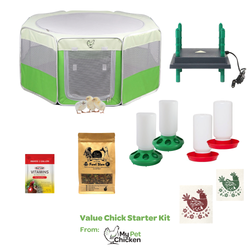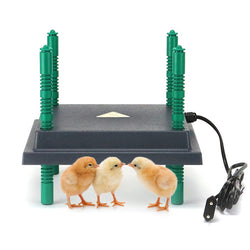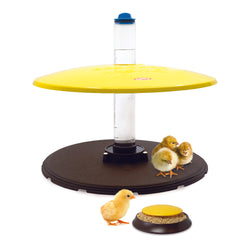All about Avian Infectious Bronchitis disease
Back to blog
Avian Infectious Bronchitis is a respiratory illness that results in death in about 5% of the birds that contract it, and may cause a permanent reduction in laying or reduce the quality of eggs in hens that survive it. As with all avian diseases, practicing good biosecurity will go a long way toward protecting your birds from this virus. Read on to find out more.
Avian Infectious Bronchitis Also called
IB, IBV, Infectious Bronchitis, Cold
Prevalence
Common
Signs
General signs
Coughing, sneezing, lack of appetite, lethargy, huddling near heat source and fluffed up down. Mucousy eyes or nares (nostrils). Thirst and loose droppings. Occasionally swelling of the wattles. Layers may also show a distinct drop in laying and misshapen eggs. Mortality from most strains is usually around 5% in adult birds, but can be higher if birds are stressed or if they're cold, or if they're baby chicks. Some strains of the disease have significantly higher mortality.
Cardinal or diagnostic signs
Lab ID only.
Cause/s
IBV (Infectious Bronchitis Virus)
Communicability
Extraordinarily communicable. Can be spread bird-to-bird directly through contact, and indirectly via feed, litter, or particles in the air. Birds may communicate the illness to other chickens for 5 months after infection. Can also be spread by and to humans from contaminated shoes or other equipment, so be sure to practice good biosecurity. The coronaviruses causing IBV cannot survive off birds long---just about one week. On surfaces, the virus is easily controlled with disinfectants.
Communicability to humans
No, humans cannot be infected with IBV. (Bronchitis in humans is caused by a different virus.) However, you can carry the virus to your birds on shoes or equipment, so be sure to thoroughly wash and sanitize hands after handling birds or equipment, and be sure to sanitize equipment.
Incubation period
24 to 48 hours
Latent
Yes. Chicks and chickens who recover can become asymptomatic carriers for up to 5 months. IBV can permanently reduce laying and cause egg quality issues.
Endemic
Yes. Different strains are common in different areas.
Home treatment and/or prevention
Prevention: There are vaccines for IBV, but there are many strains, so vaccination doesn't always prevent illness. Additionally, a vaccination program for this illness usually requires multiple treatments/boosters. Further, sometimes vaccines for IBV can induce respiratory symptoms, or bloom into illness. Practice good biosecurity. Keep your coop and run clean and dry. Sanitize your equipment, shoes, etc. Quarantine any birds showing signs of respiratory infection.
Treatment: No medication alters the course of IBV. Chickens can recover, but may always have reduced laying as a result of their illness. Still, making sure the sick birds are not subject to other stressors can reduce mortality. For instance, make sure they have access to an area that is sufficiently warm (or cool). Electrolytes in water can help.
Veterinary care
Consult a vet or your local extension agent to get a firm diagnosis. IF it is IBV, you'll want to take steps to sanitize your coop after the infection has passed. There is no medication to treat IBV, but if your birds are stressed with another illness such as air-sac disease at the same time, medication treating the complicating infection may help.
Recovery
Birds can recover, usually in 2 - 3 weeks. Those who recover can remain infectious and shed the virus in feces and from the respiratory tract for 5 months. IBV can permanently reduce laying or cause egg quality issues in survivors.
Other conditions, illnesses and/or diseases with similar signs:
Can be mistaken for Newcastle, mycoplasmas, Egg Drop Syndrome, and other respiratory infections like Coryza, Roup, and Aspergillosis.
Also consider browsing through this list of other chicken illnesses with respiratory symptoms.
Avian Infectious Bronchitis Also called
IB, IBV, Infectious Bronchitis, Cold
Prevalence
Common
Signs
General signs
Coughing, sneezing, lack of appetite, lethargy, huddling near heat source and fluffed up down. Mucousy eyes or nares (nostrils). Thirst and loose droppings. Occasionally swelling of the wattles. Layers may also show a distinct drop in laying and misshapen eggs. Mortality from most strains is usually around 5% in adult birds, but can be higher if birds are stressed or if they're cold, or if they're baby chicks. Some strains of the disease have significantly higher mortality.
Cardinal or diagnostic signs
Lab ID only.
Cause/s
IBV (Infectious Bronchitis Virus)
Communicability
Extraordinarily communicable. Can be spread bird-to-bird directly through contact, and indirectly via feed, litter, or particles in the air. Birds may communicate the illness to other chickens for 5 months after infection. Can also be spread by and to humans from contaminated shoes or other equipment, so be sure to practice good biosecurity. The coronaviruses causing IBV cannot survive off birds long---just about one week. On surfaces, the virus is easily controlled with disinfectants.
Communicability to humans
No, humans cannot be infected with IBV. (Bronchitis in humans is caused by a different virus.) However, you can carry the virus to your birds on shoes or equipment, so be sure to thoroughly wash and sanitize hands after handling birds or equipment, and be sure to sanitize equipment.
Incubation period
24 to 48 hours
Latent
Yes. Chicks and chickens who recover can become asymptomatic carriers for up to 5 months. IBV can permanently reduce laying and cause egg quality issues.
Endemic
Yes. Different strains are common in different areas.
Home treatment and/or prevention
Prevention: There are vaccines for IBV, but there are many strains, so vaccination doesn't always prevent illness. Additionally, a vaccination program for this illness usually requires multiple treatments/boosters. Further, sometimes vaccines for IBV can induce respiratory symptoms, or bloom into illness. Practice good biosecurity. Keep your coop and run clean and dry. Sanitize your equipment, shoes, etc. Quarantine any birds showing signs of respiratory infection.
Treatment: No medication alters the course of IBV. Chickens can recover, but may always have reduced laying as a result of their illness. Still, making sure the sick birds are not subject to other stressors can reduce mortality. For instance, make sure they have access to an area that is sufficiently warm (or cool). Electrolytes in water can help.
Veterinary care
Consult a vet or your local extension agent to get a firm diagnosis. IF it is IBV, you'll want to take steps to sanitize your coop after the infection has passed. There is no medication to treat IBV, but if your birds are stressed with another illness such as air-sac disease at the same time, medication treating the complicating infection may help.
Recovery
Birds can recover, usually in 2 - 3 weeks. Those who recover can remain infectious and shed the virus in feces and from the respiratory tract for 5 months. IBV can permanently reduce laying or cause egg quality issues in survivors.
Other conditions, illnesses and/or diseases with similar signs:
Can be mistaken for Newcastle, mycoplasmas, Egg Drop Syndrome, and other respiratory infections like Coryza, Roup, and Aspergillosis.
Also consider browsing through this list of other chicken illnesses with respiratory symptoms.



